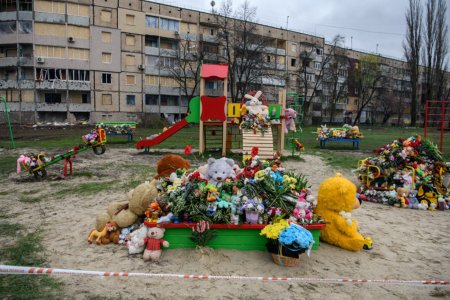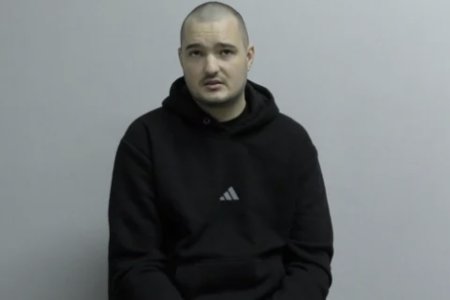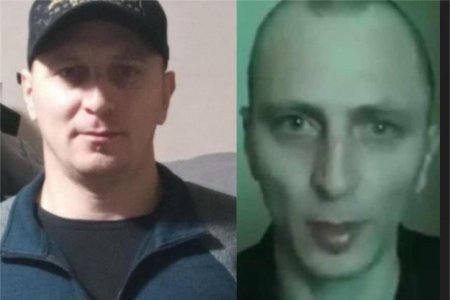
The death toll from Russia’s missile attack on a residential area in Kryvyi Rih has reached twenty, with nine children among those killed, and 76 adults and children injured, some very seriously. Russia’s claim that it was targeting military personnel has been rejected by local residents and by the UN Human Rights Office in Ukraine. The latter visited the scene on Saturday, spoke to people there and identified all of the children killed. The UN Human Rights Chief Volker Türk was entirely categorical in denouncing Russia’s attack on a residential area, including a children’s playground.
Soon after its ballistic missile attack at around 7 p.m. on Friday, 4 April, Moscow asserted that the strike had been on a restaurant where a military meeting was underway. The UN Human Rights Office has confirmed earlier reports that this is untrue. An industry forum hosted by the local business association for representatives of the beauty sector had just finished when the missile struck, with the event having been publicized online well in advance. There was also, reportedly, a birthday party at the restaurant. All witnesses told the UN representatives that there had been no military presence at all in the restaurant, let alone in the children’s playground.
Türk adds that, even if Russia had information about the supposed presence of military personnel, “the mode and circumstances of attack may constitute an indiscriminate attack”. If the latter amounted to an attack directed against civilians, this would constitute a war crime.
It is hard to see how a ballistic missile which struck just before 7 p.m. on a warm Friday evening near a restaurant and a children’s playground could not constitute an attack against civilians.

Most of the children were killed in the playground. The youngest, Tymofii, was just 3 years old. Arina Samodina and Radyslav Yatsko were seven; Hernan Tripolets was nine; Alina Kutsenko; Danylo Nikitsky and Mykyta Petekhrest were 15; Kostiantyn Novik was 16 and Nikita Solonichenko was 17.
On 5 April, Ukrainian President Volodymyr Zelensky expressed gratitude to the very many countries whose foreign ministers or other representatives had taken “a principled stance” after this latest attack. He did, however, note that the response from the US Embassy was “surprisingly disappointing” They are afraid to even say the word “Russian” when speaking about the missile that murdered children. Yes, the war must end. But to end it, we must not be afraid to call things by their names. We must not be afraid to pressure the one who continues this war and ignores all the world’s proposals to end it. We must pressure Russia – the one choosing to kill children instead of choosing a ceasefire.”
President Zelensky was not the only person to be unpleasantly surprised - or outraged – by the Ambassador’s earlier tweet This now carries a message from X that “Readers added context they thought people might want to know. The post is missing important context. The ballistic missile was launched by Russia. BBC: bbc.com/news/articles/… CNN: edition.cnn.com/2025/04/04/ame… Kyiv Independent: kyivindependent.com/12-killed-at-l…
By early Sunday evening, another tweet had appeared, in both Ukrainian and English, on US Ambassador Bridget A. Brink’s X account. This stated that “We stand in solidarity with the people of Ukraine on this day of national mourning after a Russian missile attack in Krivvy Rih killed 20, including 9 children. Our deepest condolences to the families and loved ones of all those killed and injured.”
The message, clearly naming the perpetrator of a monstrous attack, is welcome. It is, however, difficult to view the earlier omission as accidental, especially given a tweet back in late December 2024 that clearly condemned a Russian attack. Since then, the US Administration has changed, with that of President Donald Trump clearly seeking to reinstate relations with Russia. The Russian missile attack on Kryvyi Rih took place just two days after Russian leader Vladimir Putin’s investment envoy Kirill Dmitriev met with Steve Witkoff and other officials of Trump’s Administration. It is not known what Trump’s people are negotiating with a man who, until the change in administration, was under US sanctions.
At the United Nations General Assembly meeting on 25 February 2025, the USA voted with Russia, Belarus and North Korea against a UN resolution condemning Russia’s aggression against Ukraine and supporting Ukraine’s territorial integrity. It then tabled a resolution at the UN Security Council which called for an end to the conflict but contained no criticism of Russia.
When Russia is relentlessly bombing Ukrainian cities and killing or maiming civilians on a daily basis, avoiding saying so is hardly going to bring a just peace any closer. Nor, indeed, can pressurizing Ukraine into accepting Russian occupation of Ukrainian territory result in any sustainable peace. Russia will simply use any such forced acceptance of the results of its aggression as an invitation to build up its forces for its next attack.



